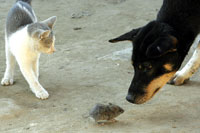|
|
As if we didn't have enough problems already, the tarai is flaring up.
While the ceasefire has restored relative calm over much of the country, in the eastern tarai districts of Saptari and Siraha the war never really stopped. The Maoists and their breakaway Tarai Janatantrik Mukti Morcha (TJMM) are battling it out with killings and abductions . What's brewing there is an ominous sign of the way things could go if the tarai grievances are not addressed promptly and decisively.
On the surface, this is a struggle for leadership of the tarai constituency between two militant leaders: Matrika Yadav of the Maoist Tarai Mukti Morcha and his arch-rival Jaya Krishna Goit of the TJMM. The two had a major falling out when they were Maoists.
Now, both are using long-standing injustices done to Nepal's Madhesi community: some four million people of the tarai don't have Nepali citizenship, many are treated like second-class citizens and face daily harassment. And in the backdrop is always competition for land among the original people of the tarai, hill settlers, and more recent migrants from India. The seeds of this crisis were sown by King Mahendra's transmigration program that changed the demographics of the plains and inner-tarai valleys.
Goit's group has now chased out most pahadi staff from government offices and schools in Saptari and Siraha. In Rupendehi and Nawalparasi, ethnic tension is mixed up with vigilantism. The resultant fear is taking symbolic forms, such as people not wearing the Nepali cap any more because it marks them as a hill person. These are ominous signs, all too reminiscent of scenes leading up to ethnic cleansing elsewhere in the world.
The NC and the UML, despite their preoccupation with the peace process, have tried to come to grips with tarai citizenship. The Nepali Congress central committee recently took the politically sensitive decision to set a cut-off date for citizenship. While some will say the NC went too far, the madhesi community says it doesn't go far enough. While citizenship is vitally important for those who don't have it, in madhesi politics it is seen more as part of the larger problem of discrimination.
The space for compromise and negotiation is narrowing. Yet if we don't find them, this could turn ugly. We've seen it around the world: whenever ethnic divisions and separatist sentiments are mixed with politics, they invariably turn underlying resentment into a long messy war. That is something this country simply can't afford.



